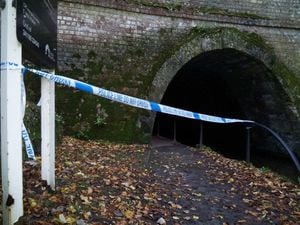Shropshire mother’s death ruled as suicide
The husband of a woman who took her own life told an inquest that mental health staff made the wrong decision not to hospitalise her.

Hannah Robyn Gration was found near a Ellesmere Canal on October 11, 2017, a day after she admitted to her community mental health nurse she had almost attempted suicide twice that same week.
At the inquest on Mrs Gration, her widower, Reverend Phillip Gration, said a hospital admission should have been discussed at her appointment on October 10.
But a nurse, and three other staff members from South Staffordshire and Shropshire Healthcare NHS Foundation Trust (SSSFT) told the hearing there were strong factors to suggest Mrs Gration had no immediate plan to end her life.
On October 11, Mrs Gration was last seen by her husband at around 8am but when her mother, Nicola Pascoe, arrived at the couple’s home for a pre-arranged visit that afternoon she was not there.
Mrs Pascoe called Mr Gration and the pair went looking for her. She was found just before 5pm near Cole Mere and the towpath.
A pre-inquest review in January heard the medical cause of death was given as hanging, and there was a small amount of alcohol in Mrs Gration’s system.
Mrs Gration, a 34-year-old mother-of-two, had been involved with mental health services for 20 years. In August 2017 her care was transferred from SSSFT’s eating disorder team to the intensive life skills (ILS) team, due to the complexity of her needs. She began seeing Ms Smith for weekly appointments, later upped to twice weekly.
On October 10 she told Ms Smith she had planned to take her life twice in the past week. There had been two similar episodes earlier in the year.
But Ms Smith said: “She was looking forward to her mum coming up that week, and she talked about wanting to get better. At no point did I think that Hannah needed hospital intervention.”
Ms Smith said that because Mrs Gration had previously said she did not find hospital helpful and had a support network at home, it was not appropriate to suggest a voluntary admission. As she had mental capacity and was not believed to be an immediate risk to herself, an involuntary admission under section was not an option either.
Two days later, when Mrs Gration failed to turn up to her next appointment, contact was made with Mr Gration who revealed his wife had died the previous day.
At the inquest, Rev Gration and Mr and Mrs Pascoe asked why Mrs Gration’s assertions that she was not going to take her life were taken at face value given her history of almost going through with it.
Rev Gration said: “The ILS team was in possession of knowledge that Hannah had planned and almost gone through with two attempts on her life with a week. That information should have triggered a discussion about hospital treatment.
“I think I am saying the wrong clinical judgement was made, and I regret to say that.”
SSSFT serious incident review co-ordinator Jenny Ball, who complied a root cause analysis report for the trust following Mrs Gration’s death, said guidance and policy were followed with the exception of a risk assessment that was not completed.
She said: “It could not have been pre-empted that she was going to kill herself.”
John Ellery, senior coroner for Shropshire, Telford & Wrekin, recorded a conclusion of suicide.
He said: “I have heard no evidence that Hannah, on October 10, met the criteria that meant she should have been admitted to hospital either voluntarily or against her will. Crucially, there is no evidence that the wrong clinical decision was made.
"Hannah’s death could not have been prevented by anything the mental health team did or didn’t do.”
